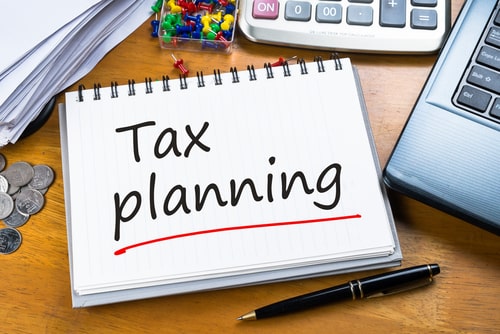Tax planning is an important part of personal spending that many people forget about. Because tax laws and regulations are so complex, it can be difficult to keep up with all the requirements. However, understanding the basics of tax planning can have a significant impact on your financial situation. In the long run, effective tax planning can help you pay less, comply with the law, and make better financial decisions. Taking the time to understand your tax return can help people get the most out of their tax returns and reduce stress during tax season.
1. Determine Your Tax Bracket
Knowing your tax rate is one of the most important parts of good tax planning. The United States has a progressive tax system, which means that your tax rate increases with your income. Understanding the different tax rates can help you figure out how much tax you owe and make smart financial decisions. This information is especially helpful when considering potential raises, bonuses, or other ways to earn money. Knowing how much of your income is taxed can help you plan to pay as little tax as possible.
2. Keeping Accurate Records
Keeping accurate records is a must for good tax records. It’s important to keep track of all your important financial documents, such as pay stubs, receipts, and bank statements, throughout the year. Organizing your records will make it easier to complete your tax return and prove any credits or losses you claim. A well-organized tax return system not only makes it easier to pay your taxes but can also provide you with useful evidence in the event of an audit. To make record-keeping easier and gain more control over your money, consider using digital tools or accounting software.
3. Take Advantage of Tax Credits and Deductions
Getting as many credits and deductions as possible is one of the best ways to reduce your tax bill. Credits reduce the amount of tax you owe directly, while deductions reduce the amount of income that is taxable. Learn about the most popular tax deductions available to people, such as medical expenses, mortgage interest, and student loan interest. Also, consider tax credits. You may be able to ask them to help pay for things like college tuition, home energy efficiency, or child care. Taking advantage of all the benefits and credits available can significantly reduce your taxes and keep more of your hard-earned money.
4. Put Money Into a Retirement Plan
Putting money into a retirement account not only helps ensure your long-term financial security, but it can also help you pay your taxes immediately. People can put money into accounts like standard IRAs and 401(k)s before they withdraw their taxes. This lowers their taxable income for the year. Additionally, many companies will match the money you put into your retirement plan, which can make your savings even bigger. Understanding the rules and restrictions on where you can invest in these funds can help you save on taxes while planning for the future.
5. Understand Capital Gains Tax
When you sell stocks, real estate, or other investments and make money, you may have to pay capital gains taxes. To plan your taxes properly, you need to understand how capital gains taxes work. Long-term capital gains result from assets held for more than one year. They are taxed at a lower rate than short-term capital gains, which are taxed at your regular income tax rate. This difference can help you make better business decisions and determine when to sell assets for the best tax deduction. If you plan for your capital gains in advance, the total amount of tax you have to pay can make a big difference.
6. Filing Status Matters
How you file your taxes can have a big impact on how much you owe. The IRS accepts several filing options, such as single, married filing equally, married filing separately, head of household, or qualifying widow or widower. Each category has different rules, tax deductions, and tax rates. Knowing which filing status is right for you can save you a lot of money in taxes. For example, married people may benefit from filing jointly, as it often means lower tax rates and more tax credits and deductions. Be sure to weigh your options carefully so you can choose the tax status that works best for you.
7. How to Use a Health Savings Account
A Health Savings Account (HSA) is a great way for people to save on taxes and medical bills. You can deduct the money you put into an HSA from your taxes, and the money you withdraw for approved medical expenses is tax-free. There is also no tax on interest or financial income that is deposited into the account. People with high-deductible health insurance can get the most out of an HSA, which can help them save money on out-of-pocket medical expenses while also earning a tax deduction. Understanding the rules of an HSA can help you take full advantage of this useful money-making tool.
8. Thoughts on Tax-Advanced Accounts
In addition to HSAs and retirement accounts, you may also want to consider flexible spending accounts (FSAs) and 529 plans, which are also tax-advantaged funds. The Financial Services Authority lets people save money on a pre-tax basis to pay for certain medical expenses, which reduces their tax liability. A 529 plan is a savings account that can be used to pay for college tuition. Growth and payments are tax-free as long as the money is used for approved school expenses. By exploring these options, you may find more ways to save on taxes and achieve your financial goals.
9. Evaluate Changes in Tax Laws
Tax laws can change, and it’s important to stay up-to-date on any improvements or changes if you want to plan your taxes properly. New laws can change tax rates, deductions, and credits, which could mean changing the way you pay your taxes. Staying up-to-date on these changes can help you make quick changes to your financial plan and ensure you’re following the latest tax rules. Talking to a tax professional daily or reading a reliable financial news source can help you stay up-to-date on any changes that could affect your taxes.
10. Why Preparing Early Helps
Finally, the entire process can be easier and less stressful if you prepare to file your taxes early. If you wait until the last minute to gather tax documents and file your return, you could make mistakes, miss out on benefits, or even get a penalty. By starting early, you can take the time to prepare documents, assess your financial situation, and get professional help if you need it. This proactive approach can help you make better decisions and ultimately lead to better tax results. Starting your preparations early can help reduce stress and ensure you’re ready for tax season.
Conclusion
Finally, knowing a few key tax tips can help people take control of their finances. You can lower your tax bill by understanding your tax bracket, keeping good records, taking advantage of tax breaks, and adding credits and benefits. Following tax rules, working with professionals, and planning for the impact of taxes in the future are also important parts of good tax management. When people plan and take action, they can navigate the complex tax system with confidence, which will ultimately lead to a better financial future.
FAQs
1. Why is Tax Planning Important?
Tax planning can help you pay as little tax as possible, stay compliant, and make smart financial choices.
2. How to Get the Maximum Tax Deduction?
Understand what benefits are available to you and keep good records of all the expenses you can deduct throughout the year.
3. What is a tax-advantaged account?
Tax-advantaged accounts, such as HSAs and 529 plans, allow you to save for college or medical expenses while taking a tax deduction.
4. Should I hire a tax professional?
If your financial situation is complex or you don’t understand tax rules, talking to a tax professional can be a big help.
5. Why is it important to file your taxes early?
Preparing early can help you stay organized, reduce stress, and avoid making mistakes that could cost you money or miss out on a refund.




